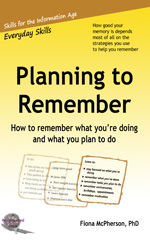Is multitasking really a modern-day evil?
In A Prehistory of Ordinary People, anthropologist Monica Smith argues that rather than deploring multitasking, we should celebrate it as the human ability that separates us from other animals.
Her thesis that we owe our success to our ability to juggle multiple competing demands and to pick up and put down the same project until completion certainly makes a good point. Yes, memory and imagination (our ability to project into the future) enable us to remember the tasks we’re in the middle of, and allow us to switch between tasks. And this is undeniably a good thing.
I agree (and I don’t think have ever denied) that multitasking is not in itself ‘bad’. I don’t think it’s new, either. These are, I would suggest, straw men — but I’m not decrying her raising them. Reports in the media are prone to talking about multitasking as if it is evil and novel, and a symptom of all that is wrong in modern life. It is right to challenge those assumptions.
The problem with multitasking is not that it is inherently evil. The point is to know when to stop.
There are two main dangers with multitasking, which we might term the acute and the chronic. The acute danger is when we multitask while doing something that has the potential to risk our own and others’ safety. Driving a vehicle is the obvious example, and I have reported on many studies over the past few years that demonstrate the relative dangers of different tasks (such as talking on a cellphone) while driving a car. Similarly, interruptions in hospitals increase the probability of clinical errors, some of which can have dire consequences. And of course on a daily level, acute problems can arise when we fail to do one task adequately because we are trying to do other tasks at the same time.
A chronic danger of multitasking that has produced endless articles in recent years is the suggestion that all this technology-driven multitasking is making us incapable of deep thought or focused attention.
But Smith argues that we do not, in fact, engage in levels of multitasking that are that much different from those exhibited in prehistoric times. ‘That much’ is of course the get-out phrase. How much difference is too much? Is there a point at which multitasking is too much, and have we reached it?
These are the real questions, and I don’t think the answer is something we can draw a line with. Research with driver-multitasking has revealed significant differences between drivers, as a function of age, as a function of personal attributes, as a function of emotional or physical state. It has revealed differences between tasks —e.g. talking that involves emotions or decisions is more distracting than less engaging conversation; half-overheard conversations are surprisingly distracting (suggesting that having a passenger in the car talking on a phone may be more distracting than doing it yourself!). These are the sort of things we need to know — not that multitasking is bad, but when it is bad.
This approach applies to the chronic problem also, although it is much more difficult to study. But these are some of the questions we need to know the answers to:
- Does chronic multitasking affect our long-term ability to concentrate, or only our ability to concentrate while in the multitasking environment?
- If it does affect our long-term ability to concentrate, can we reverse the effect? If so, how?
- Is the effect on children and adolescents different from that of adults?
- Does chronic multitasking produce beneficial cognitive effects? If so, is this of greater benefit for some people rather than others? (For example, multitasking training may benefit older adults)
- What are the variables in multitasking that affect our cognition in these ways? (For example, the number of tasks being performed simultaneously; the length of time spent on each one before switching; the number of times switching occurs within a defined period; the complexity of the tasks; the ways in which these and other factors might interact with temporary personal variables, such as mood, fatigue, alcohol, and more durable personal variables such as age and personality)
We need to be thinking in terms of multitasking contexts rather than multitasking as one uniform (and negative) behavior. I would be interested to hear your views on multitasking contexts you find beneficial, pleasant or useful, and contexts you find difficult, unpleasant or damaging.
